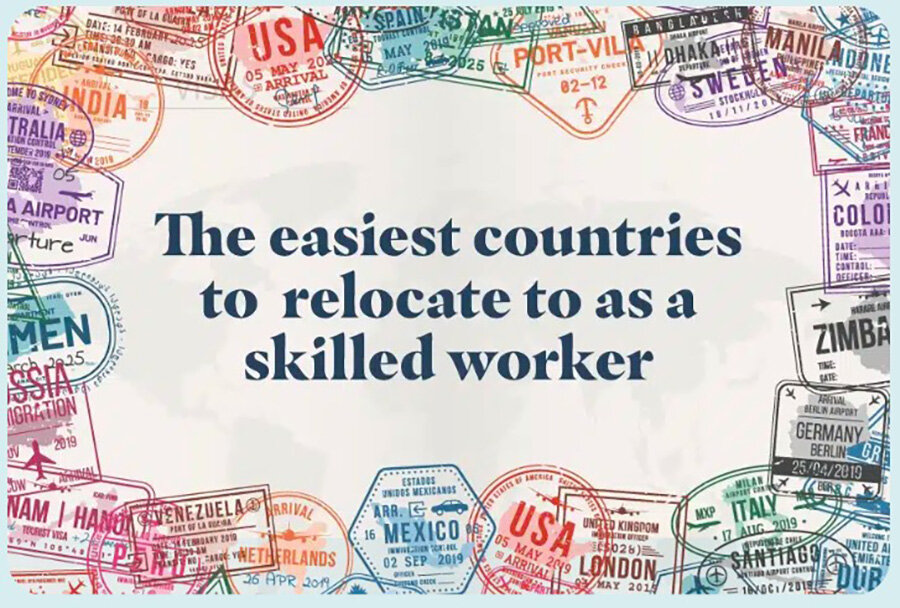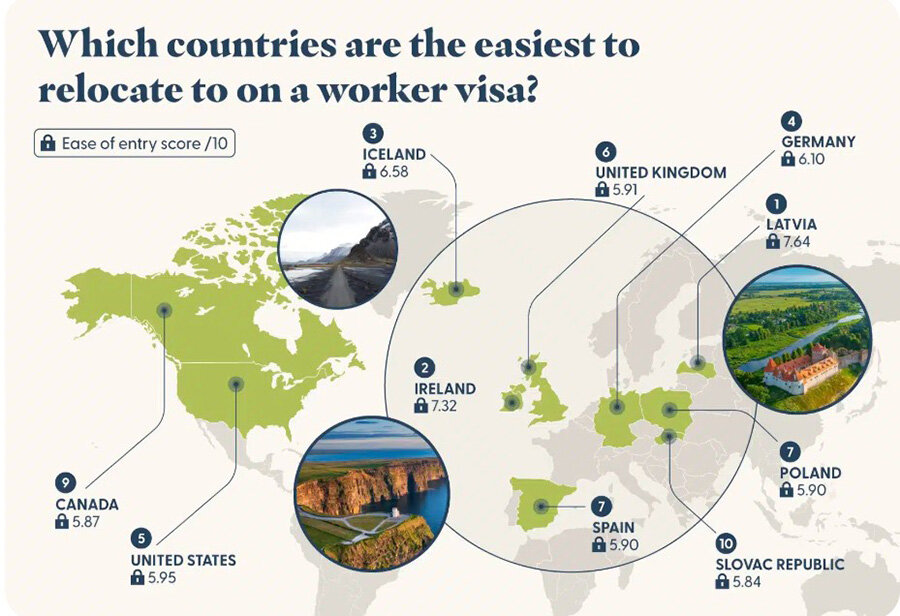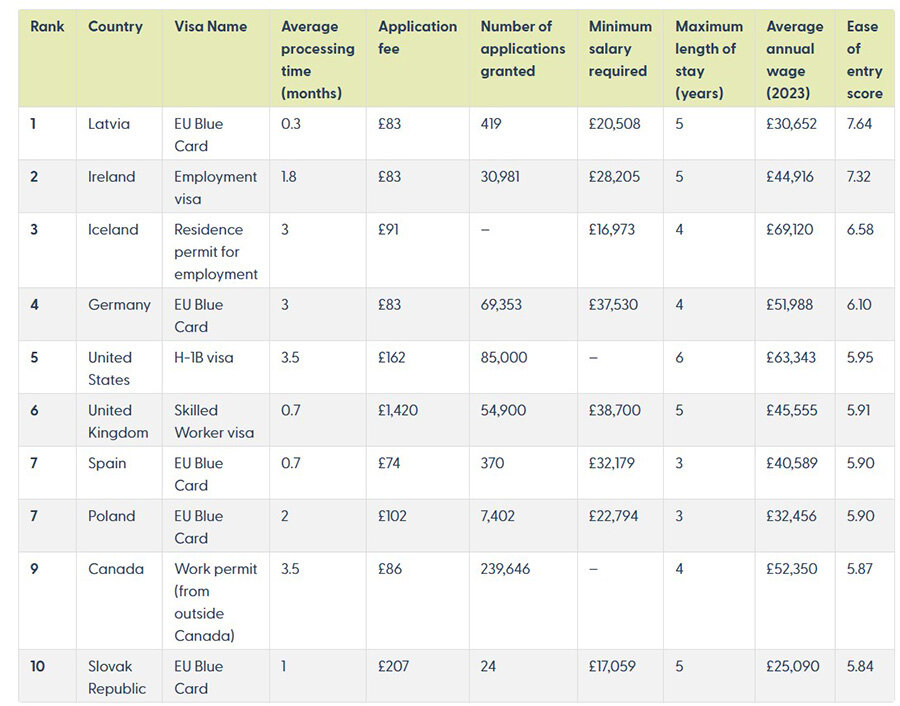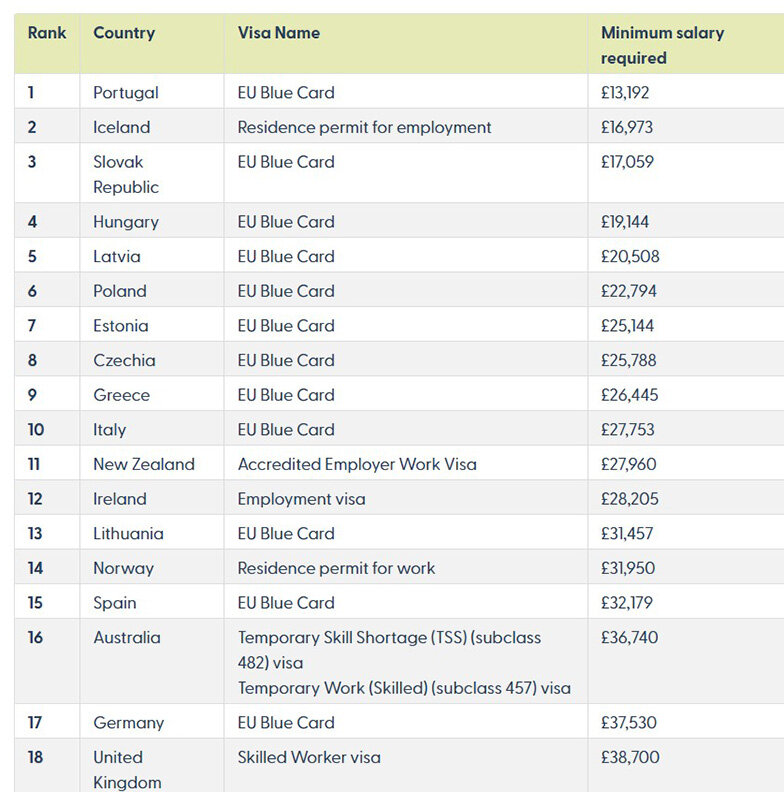Migration / Analytics / Research / Ratings / Latvia / Ireland / Czech Republic / Netherlands / Iceland / Germany / United Kingdom 06.08.2025
Where It's Easiest to Get a Work Visa: Global Rankings for 2025

Photo: InternationalInvestment.biz
As global talent competition intensifies, work migration has become a key tool for economic competitiveness. In 2025, two major international studies—by Remitly and Eskimoz—analyzed which countries offer the most accessible conditions for skilled workers. While the lists differ, Germany, the UK, Ireland, and Iceland appear on both.
Remitly: From Latvia to Slovakia
The analysis by Remitly's research team evaluated four main factors:
Average visa processing time
Application cost
Minimum income requirement
Maximum visa duration
Each country received an Ease of Entry index, reflecting how accessible their skilled migration system is.

Latvia tops the ranking with an index of 7.64. The country offers an EU Blue Card with an average processing time of just 0.3 months, a consular fee of £83 ($112), a minimum annual income requirement of £20,508 ($27,700), and a visa validity of up to five years.
Ireland ranks second (7.32 index), issuing work visas in 1.8 months, with similar fees and income thresholds. The maximum validity is also five years.
Iceland (6.58 index) follows, with a minimum income requirement of £16,973 ($22,940) and a processing time of around three months. Visas are valid up to four years.
Germany offers an EU Blue Card with a £37,530 ($50,650) minimum income requirement.
USA takes fifth place, offering H‑1B visas valid for up to six years.

The UK ranks sixth (5.91 index) with higher fees (£1,420/$1,917) and income thresholds (£38,700/$52,245) but a short processing time of three weeks.
Also in the top ten:
Spain, Poland (5.90 index)
Canada (5.87)
Slovakia (5.84)
Portugal ranks first for the lowest minimum income requirement—just £13,192 ($17,809) annually.

Eskimoz: Singapore, Netherlands, and Czechia Lead
Eskimoz evaluated countries by:
Visa cost and processing time
Immigration law transparency
Salary and qualification requirements
Political stability, unemployment, and language barriers
Singapore leads with a 92 index. Its structured points-based system allows visas to be issued in two weeks with a $105 fee. Low unemployment (2.1%) and stable governance boost its attractiveness.
Netherlands (index 81): transparent process, high salary (€5,746/month), minimal language barrier.
Czechia (index 76): uses Blue Cards and employee permits with fees of $216, processing time of 1–2 months, and high political stability.
New Zealand and ?? South Korea tie for fourth (index 72).
France ranks fifth (index 69) with clear procedures but 7.5% unemployment.
UK takes sixth (index 68), raising its minimum salary requirement to $4,049/month.
Germany and Iceland are seventh (index 67), offering advantages for shortage occupations.
Australia is eighth (index 65), with high fees but strong stability.
Ireland ranks ninth (index 64).
Luxembourg closes the top ten (index 63) with the highest salary threshold—$7,371/month.
Conclusion
These studies highlight the growing policy divergence across countries. Some prioritize attracting skilled talent by reducing entry barriers, while others maintain strict wage thresholds that may deter younger professionals.
Open economies win—countries like Singapore show how liberal immigration laws attract global talent and drive growth.
High barriers hurt—the UK, Luxembourg, and Australia face criticism for setting unreasonably high wage requirements.
Подсказки: work visa, skilled migration, EU Blue Card, Remitly, Eskimoz, Latvia, Singapore, Germany, UK, immigration ranking, 2025 migration policy








